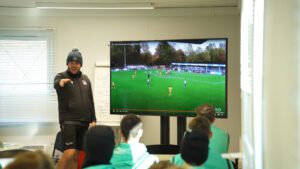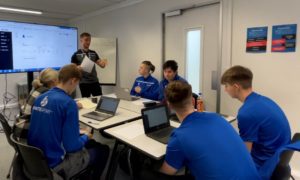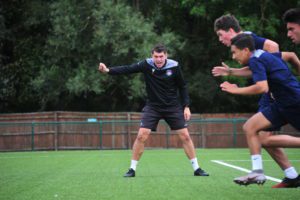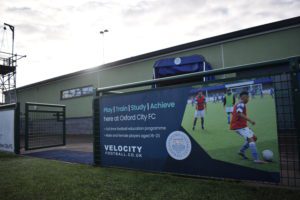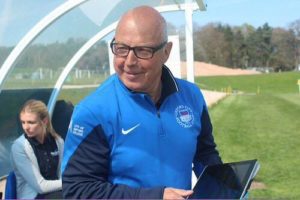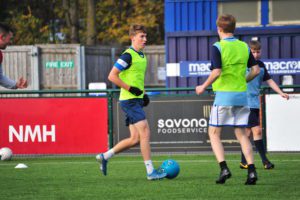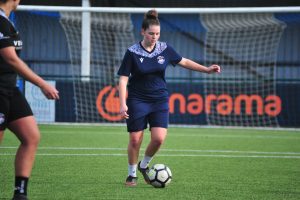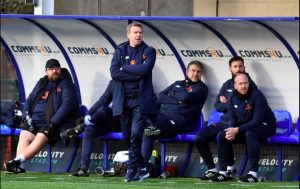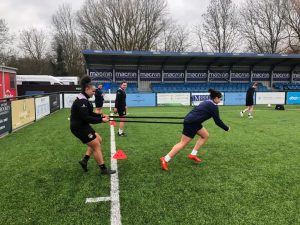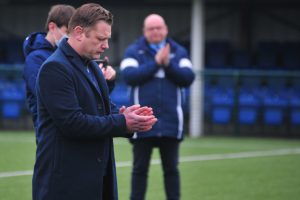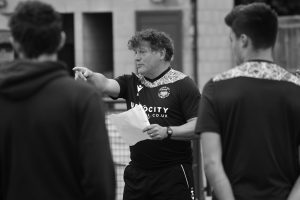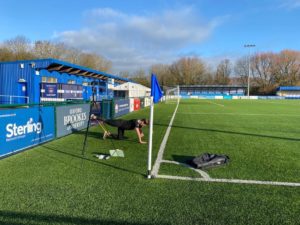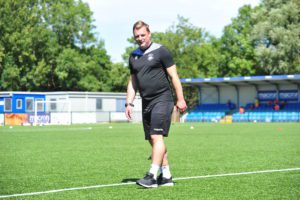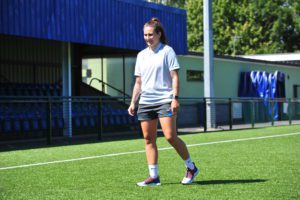David Oldfield has been first-team manager at Oxford City Football Club since March 2020.
Amid a global pandemic he helped City reach the FA Cup second round and was on course to record the club’s highest ever non-league finish before the season was cancelled.
David decided to pursue a career in coaching when he joined Stoke City as a 29-year-old in 1998. Coaching in the professional game is a rewarding but unforgiving business. But it is broader than it first appears with many coaches enjoying careers in school and community settings, in gyms as personal trainers or even motivational speakers.
As part of Velocity Football’s Careers in Sport series, we spoke to David to learn more about his profession and the pathways available.
Career progression
David played more than 650 professional football matches as a midfielder for clubs including Manchester City, Leicester City, Luton Town, Peterborough United and Oxford United.
On average professional footballers retire from playing aged 35. David was fortunate to play his final competitive game aged 39.
At that stage David moved from playing to coaching.
“Both of my parents were teachers, so there was always an aspect of coaching that interested me from a young age,” said David. “When I signed for Stoke City, I realised I wanted to make the first steps in what might happen next, and I wanted that to be coaching.
“I worked towards my badges and qualification before an opportunity to coach and manage presented itself to me when my playing career ended. I consider myself very fortunate to have been able to swap careers smoothly.”
Education
People interested in becoming a qualified football coach should look to develop their skills by gaining FA Coaching Badges.
There are five FA badges to earn that start at Level 1 and conclude at Level 5 (UEFA Pro). The courses provide people with the guidance and knowledge to become a qualified football coach from grassroots to elite level.
David added: “The FA coaching pathway allows people to learn the ins and outs of coaching. Level 1 and 2 courses are delivered here at Oxford City via Oxfordshire FA and our club and Velocity Football partners Ignite Sport UK.
“Progression is important. As a manager you must keep looking forward at every opportunity and never take your work for granted. Similarly, a coach should always aspire to develop their skills to enhance their session or programme delivery.”
The FA Level 1 coaching course is open to anyone aged over 16 and costs £150 to complete. For further information, visit the Ignite Sport UK website.
Key responsibilities
As manager of Oxford City FC, David is responsible for the development of his squad and individual players who compete in National League South – tier six of English football.
The job requires strong communication, motivation and man-management skills to ensure first-team players and staff work towards a collective vision to be as effective as possible.
He said: “It’s key that I understand how important this club is to people. Under my management, we all work together as a collective staff rather than the people working for the manager.
“A lot of talking takes place off the pitch too irrespective of what happens on the pitch. We must be efficient at Oxford City, as like many teams in our division we are only part time.
“It’s not always easy, but myself, my coaching and backroom team and the players all do our best to make the running process as smooth as possible through good communication and preparation.”
Collective goal
David underlined the importance of being able to work with and manage all individuals as a key trait for any sports coach.
He added: “The best quality of a football manager and coach is being able to deal with people. Specifically, to my role in the first team, it is important to balance player management with the requirements and demands of football while understanding each person is different.
“Team cohesion is vitally important, if everyone pulls together with the same ambitions, work rate and vision you’re likely to experience success. But within a team or group there will always be individuals leading their own lives, which is fine.
“At Oxford City, we want our community spirit to shine through too so my role within the first team is one of a number of elements under the club’s umbrella to play well and support the provision of football in the city.”
Strive for success
David and the backroom team at Oxford City FC have regular engagement with Velocity Football’s students. The pathway from Velocity Football into the club is a big part of the education programme’s development opportunity for students.
As part of this David has delivered sessions at Velocity Football to inspire the next generation of players, coaches and professionals in the sports sector.
“I am very impressed with Velocity Football,” said David.
“Velocity Football is an excellent platform for young people wishing to take their first steps in exploring a career in sport.
“As a coach, I would always advise people to work as hard as they can and keep progressing their knowledge and understanding of coaching by moving forwards with qualifications. At Velocity, you get the best of both worlds.
“You can develop your game while studying towards a valuable qualification that will set you up well for a career in sport in many sectors.
“Coaching is very competitive and difficult at the top level where you’re in an environment where things can change so quickly. That is why education in football is so important, you never know when you might have to adapt.”
Oxford City
Due to the COVID-19 pandemic, Oxford City’s season was declared null and void in February with the Hoops sitting fourth in the table with games in hand.
Frustrating as it might be, David vowed to lead by example and look forward to the opportunities that will present themselves in the 2021-22 campaign.
“It’s disappointing the current season had to be cancelled,” said David. “But as I have said, we need to look forward.
“The new season starts soon, and we have had time to build fitness up.”

